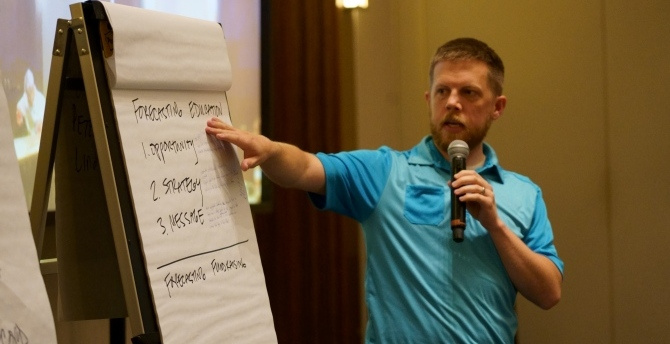
In August, 20 of the top think tank CEOs in the U.S. gathered in Tyson’s Corner, Virginia (with strict social distancing practices in place) to redefine the liberty agenda for 2021 and beyond. With COVID-19 and social unrest on their minds, the group, a subset of Atlas Network’s Global Council of CEOs, worked intensively to identify the crucial issues, opportunities, strategies, and messaging that would optimize this moment in American history for the benefit of human freedom.
These events represent crucial opportunities for busy CEOs to connect with peers. According to Institute for Humane Studies CEO Emily Chamlee-Wright, “Connecting with peer colleagues in an atmosphere of positive challenge and collaboration is an opportunity to refuel and recommit to the important work we do. I'm grateful to the Atlas Network for creating the space organizational leaders need to learn from one another.”
One of the richest discussions that took place over the Summit’s two and a half days concerned education policy in the United States—both K-12 and higher education—recognizing the gap many parents are experiencing between resources committed to education services and the quality of delivery. With public schools understandably struggling to navigate the impacts of the pandemic, parents are demanding flexibility in the marketplace.
An effect of this phenomenon is a mainstreaming of homeschooling and the emergence of creative pod-based solutions to meeting local needs. How the regulatory environment adapts to support these solutions will be key and think tanks at the national and state level are launching diverse research and education projects to help policymakers and parents work together for the good of our children. In higher education, new options for accreditation, certification, and alternatives to four-year college also demand an innovative rethinking of workforce preparedness and training.
One participant noted that with the court system still functioning (with virtual hearings in many places), litigation related to education is expected to continue apace and likely to increase. Those suits promise to pave the way for an “Uberized” educational landscape where the power of innovation and decentralized decision-making promises to disrupt the way education services are delivered perhaps forever.
Kent Lassman, CEO of Competitive Enterprise Institute, made clear the value of looking ahead in a forum like this when he remarked, “Looking around corners is not just a metaphor. It is a way forward for liberty minded leaders who collaborate in a spirit of trust fostered by the Atlas Network.”
Looking ahead also included issues of race, criminal justice, and policing. This network has a long history of tackling problematic issues in those areas including the unconstitutional practices surrounding qualified immunity, civil asset forfeiture, and policing in general. With the increased focus on race in 2020, the CEOs strategized how best to work together to advance this cause effectively, joining forces with diverse coalitions on liberty-based solutions without taking for granted the threats posed by those who recognize injustices but whose solutions would make matters worse.
Lastly, the capacity of the network was also a key topic as CEOs shared with each other their latest innovative approaches to strengthening their organizations’ abilities to meet the challenges of the day by rapidly adapting to virtual work, fewer in-person meetings, and new opportunities to communicate our messaging effectively and more broadly to all stakeholders.
Foundation for Economic Education President and CEO Žilvinas Šilėnas summarized his experience by saying, “Leading a liberty think tank is the most rewarding job, but it can get lonely. We all employ great analysts, academics, but it is the CEO’s job to bridge dreams and reality, creativity and production. Many of the issues think tank CEOs face share similarities, and advice from fellow CEOs who understand the business of liberty think tanks is invaluable. Atlas Network’s CEO Summit allows me to reestablish my strategic vision and then implement it with my team.”
Atlas Network began the CEO Summit cohort model several years ago and it has proven to be a critical professional development opportunity for think tank leaders who benefit immensely from peer support and dialogue.
Utah-based Libertas Institute CEO and author of the wildly popular children’s books, The Tuttle Twins, Connor Boyack reflected on the experience saying, “Running an organization often leads me to get bogged down in tiny tasks and minutiae required by the job—so the CEO summit was a breath of fresh air for me to take some time and think about big picture ideas involving higher-level thinking. It was therapeutic, productive, and something I look forward to doing again very soon!”
Pacific Legal Foundation CEO Steven Anderson had something similar to say after the event, “Among Atlas Network's strengths is bringing together the best minds to discuss the most important issues of the day and how they affect our ability to spread liberty throughout the world. The participants are well chosen, the agenda well-conceived, and the execution well done. Looking forward to my next one!”
Another state-based think tank CEO, Jon Caldara of Colorado’s Independence Institute, said, “In the last several years Atlas Network has raised its already impressive game. Bringing CEOs together in a small group to share ideas, experiences, and failures has had remarkable benefits. Thank you, Atlas Network!”
Acton Institute’s Kris Mauren agreed, writing, “What a great way to spend a few days! Thanks for creating the opportunity for fellow movement CEOs to gather at this critical time in our country's history.”